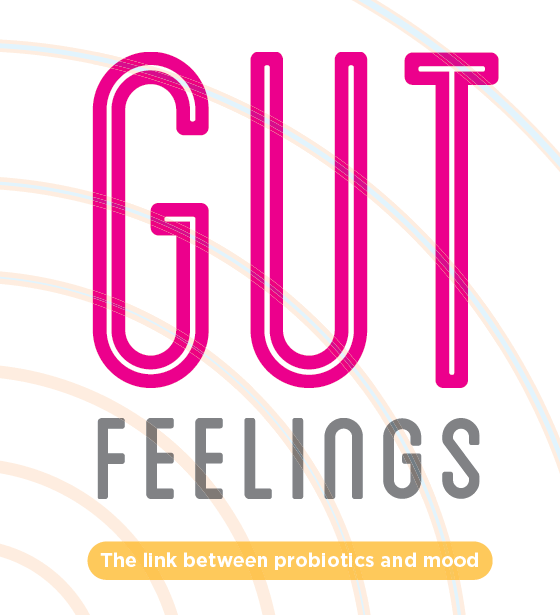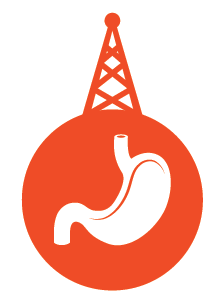Gut Feelings: The Link Between Probiotics and Mood
The terms “gut feeling” or “gut reaction” have been used for decades to express intuitive, personal feelings or instincts. But there’s a growing body of biological and clinical research that shows there’s a lot of truth behind those idioms.
What’s happening in the gut?
In many ways, the gut can be thought of as a minibrain center. It is filled with nerves and communicates directly with the brain, sending signals that make you feel hungry, full, or even sick. The gut is also full of microbial organism—about 100 trillion. These microorganisms (often referred to as gut flora or intestinal flora) provide a number of useful functions such as helping to extract energy from undigested carbohydrates, synthesizing some vitamins, and metabolizing a number of fluids.
What are Probiotics?
Probiotics are strains of bacteria that help maintain the natural balance of flora in the human gut. Simply put, there can be harmful or helpful bacteria in the gut, and taking probiotics (through food or a supplement) adds to the number of helpful bacteria and strengthens their ability to keep bad bacteria in check. What scientists are now discovering is that the flora itself has a direct influence on what messages are sent from the gut to the brain.
The probiotic mood connection
The ability of probiotics to influence brain chemistry and behavior was first demonstrated using mice.1 When mice were given a probiotic diet for two weeks, they exhibited fewer signs of measurable anxiety and lower levels of stress hormones. In fact, according to researcher John Cryan, the effects on behavior of the mice given probiotics were very similar to mice who were given an injection of valium.2 And while the research was promising, human flora is far more complex than mouse flora, so it was difficult to predict if a similar effect could be experienced by humans.
The real breakthrough came from a study led by Dr. Kirsten Tillisch of UCLA. In the study, healthy women from ages 18 to 55 were broken into three groups: one which ate probiotic-rich yogurt, another that ate a yogurt-like dairy product without probiotics, and a third that ate no product at all. After four weeks, the group of women who ate the probiotic-rich yogurt twice a day showed decreased engagement in the parts of the brain that integrate internal body sensations and emotional response—both while in a resting state and in response to an emotion recognition task.3 Simply stated, they remained calmer and more focused.
While more research needs to be done to determine which chemicals produced by the gut bacteria actually trigger the signals to the brain, the implications give a whole new meaning to the idea of “stress eating.” Think about it, a simple change to your diet may help improve your mood and better help you cope with stress and anxiety
Beneficial Bacteria Binge
So what are the best ways to get some extra probiotics into your day? Probiotics are found in foods packed with living yeast and bacteria species. Here’s a quick look at some common (and not so common) sources.
Yogurt
Yogurt is the easiest-to-fi nd and richest source of probiotics. Just make sure it contains “live active cultures.” And make sure you keep it cold. Heat can kill the cultures.
Kefir
A fermented milk drink,
it is commonly available
plain or as a “smoothie”
drink in fruit fl avors.
Dark Chocolate
High-quality dark chocolates
contain natural probiotics
and can be boosted with
added probiotics as well.
Kombucha
A fermented, sweetened
tea made typically from
black tea, but also available
in green tea and white tea
forms. It’s a naturally fi zzy
tea that has a tart, sour taste
with a hint of sweetness.
Sauerkraut
Pile it on your hot dog
or sausage for a probiotic
punch. Just make sure
it’s “raw” or “live.”
Sauerkraut that is heatpasteurized
won’t contain
any healthy bacteria.
Miso Soup
A staple in traditional
Japanese cuisine, this
soup made from
fermented rye, beans,
rice, or barley provides
powerful probiotics
in every spoonful.
Kimchi
Similar to sauerkraut,
kimchi (or kimchee) is
spicy fermented cabbage
that is a staple side dish
in Korea and often added
to stew or fried rice.
Keep your health in balance with the natural power of Florify
One daily dose of Florify contains the same probiotic power as 10 cups of yogurt! Five billion colonies of acid-resistant flora from two strains target both your small intestine and your colon. Florify also has a proprietary blend of FOS (fructooligosaccharides) to promote the growth of probiotics in the gut.* Florify is the ideal way to increase your daily probiotic intake.
Maximize your probiotic potency with FiberWise
FiberWise helps make the most of the probiotics you eat with four sources of natural prebiotics. Prebiotics stimulate the growth and activity of probiotics to help you get full benefi ts of this healthy bacteria. FiberWise also includes Lactobacilus acidophilus to boost your probiotic intake. Taken with Florify, FiberWise works synergistically to maximize the power of your probiotics.
2. Javier A. Bravo, Paul Forsythe, Marianne V. Chew, Emily Escaravage, Hélène M. Savignac, Timothy G. Dinan, John Bienenstock, John F. Cryan, “Ingestion of Lactobacillus strain regulates emotional behavior and central GABA receptor expression in a mouse via the vagus nerve,” Proceedings of the National Academy of Sciences of the United States of America, August 29, 2011.
3. Kirsten Tillisch, Jennifer Labus, Lisa Kilpatrick, Zhiguo Jiang, et. al., “Consumption of Fermented Milk Product With Probiotic Modulates Brain Activity,” Gastroenterology, vol. 144, no. 7, June 2013, pgs 1394–1401. e4.
* These statements have not been evaluated by the Food & Drug Administration. This product is not intended to diagnose, treat, cure, or prevent any disease.



Very Good. I am a member.